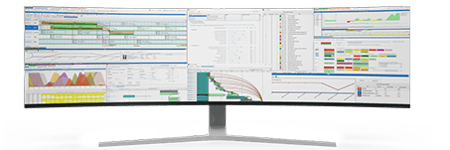Quality Cost, Prevent Defects, and Build Trust Strategies
Operations Directors must continuously seek ways to balance the costs of ensuring quality while maintaining profitability. One of the most significant costs incurred by any manufacturing facility is the cost of poor quality (COPQ), which includes the direct and indirect costs associated with defects, rework, and failure to meet customer expectations. As industries become more competitive, companies are focusing on preventing defects at the source and building trust with their customers by consistently delivering high-quality products.
One of the key enablers in achieving this is integrating advanced planning and scheduling tools, like PlanetTogether, with enterprise resource planning (ERP) systems such as SAP, Oracle, Microsoft Dynamics, Kinaxis, or Aveva. By seamlessly connecting shop floor operations with broader enterprise systems, manufacturers can take a holistic approach to managing quality, reducing costs, and building customer trust.
This blog will explore how manufacturing facilities can tackle the challenges of quality cost management, defect prevention, and trust-building through practical strategies supported by technology integration.

Understanding the Cost of Poor Quality (COPQ)
COPQ is not just limited to the cost of defective products; it includes the hidden costs associated with internal and external failures, appraisal costs, and prevention costs. Operations Directors in industrial manufacturing need to recognize that poor quality extends beyond the product itself and can have a ripple effect across the entire operation.
Internal and External Failure Costs
- Internal failure costs are incurred before the product reaches the customer, including scrap, rework, and downtime.
- External failure costs occur when defects are identified after delivery, leading to warranty claims, returns, or even damage to the brand’s reputation.
Appraisal and Prevention Costs
- Appraisal costs involve activities like inspection, testing, and audits that verify product quality.
- Prevention costs refer to investments made to avoid defects, such as training, process control, and preventive maintenance.
The challenge for Operations Directors lies in optimizing the balance between these costs, striving to minimize failure costs while ensuring that appraisal and prevention activities are both effective and efficient.

Preventing Defects: Lean Six Sigma and Continuous Improvement
Preventing defects is the most cost-effective strategy for managing quality, and Lean Six Sigma methodologies offer powerful tools for this. Lean focuses on eliminating waste, while Six Sigma aims to reduce process variation, both of which are critical in defect prevention. A robust defect prevention strategy should include:
- Root Cause Analysis (RCA): Understanding the underlying causes of defects, not just the symptoms.
- Failure Mode and Effects Analysis (FMEA): Proactively identifying potential failure points in processes and products.
- Statistical Process Control (SPC): Using data to monitor and control production processes, ensuring consistency and identifying variations early.
However, applying these methods in isolation may not be sufficient. To prevent defects at scale, manufacturers need real-time data and insights into their operations, which can only be achieved through the integration of advanced planning and scheduling systems like PlanetTogether with their ERP or MES (Manufacturing Execution System).

Building Trust through Quality: The Role of Data-Driven Manufacturing
In today's hyper-competitive industrial manufacturing landscape, trust is built on the foundation of consistent product quality and reliable delivery. Customers expect not only defect-free products but also transparency and traceability in the production process. To meet these demands, manufacturers must leverage data and integrate systems across the organization to create a connected, intelligent manufacturing environment.
Real-Time Visibility and Monitoring
Real-time visibility into shop floor operations is crucial for preventing defects before they occur. Integrating PlanetTogether with an ERP system like SAP or Oracle allows Operations Directors to monitor production processes, inventory levels, and equipment performance in real-time. By connecting the dots between production schedules, material availability, and quality control, manufacturers can respond quickly to any deviations that may lead to defects.
For example, with SAP's advanced ERP functionalities, quality management modules can be linked with PlanetTogether’s production scheduling. This integration ensures that any quality issues or deviations detected in real-time are immediately communicated to the relevant departments, enabling swift corrective actions to be taken.
Predictive Analytics and Preventive Maintenance
Another key aspect of defect prevention is maintaining equipment reliability. Unplanned downtime or equipment malfunctions can lead to quality issues. Predictive analytics, enabled by integrating ERP systems with advanced scheduling tools, help identify patterns in machine performance that may indicate an impending failure.
For example, Microsoft Dynamics or Aveva, when integrated with PlanetTogether, can offer predictive maintenance capabilities. By analyzing machine data, the systems can forecast when maintenance is needed, thus preventing unexpected breakdowns that could lead to quality defects. Preventive maintenance ensures that equipment operates within optimal parameters, reducing variability in the production process and improving product quality.
Standardization and Process Control
Incorporating standardized operating procedures and strict process controls across all stages of production helps to ensure that quality is consistent. Kinaxis, when integrated with PlanetTogether, provides powerful demand and supply planning functionalities that align with production schedules. This alignment ensures that every step of the production process follows a standardized workflow, reducing variability and the risk of defects.
This integration also enhances compliance with regulatory standards, particularly in industries like pharmaceuticals and aerospace, where traceability and quality control are critical. By linking ERP systems with production scheduling tools, Operations Directors can ensure that all necessary quality checks are performed at each stage, and all data is recorded for audit purposes.
![]()

Integration of PlanetTogether with ERP Systems: Enhancing Defect Prevention and Quality Control
The integration of advanced planning and scheduling tools like PlanetTogether with ERP systems such as SAP, Oracle, Microsoft Dynamics, Kinaxis, and Aveva can significantly improve a manufacturer’s ability to prevent defects and control quality. This integration provides a comprehensive view of operations, enabling real-time decision-making and proactive defect prevention strategies.
Here’s how the integration can play a critical role:
Closed-Loop Feedback System
Integrating PlanetTogether with ERP systems creates a closed-loop feedback system, where information flows seamlessly between the shop floor and the management level. This ensures that any quality-related issues detected during production are immediately communicated to the relevant stakeholders, allowing them to take corrective actions.
For example, in a packaging manufacturing facility, the integration between PlanetTogether and Oracle allows for real-time tracking of defects, with data fed directly into the production schedule. This enables managers to adjust workflows or allocate resources more effectively, minimizing downtime and preventing further defects.
Enhanced Supply Chain Synchronization
Quality issues often arise due to misaligned supply chain activities. Integrating Kinaxis or Microsoft Dynamics with PlanetTogether allows manufacturers to synchronize their supply chain with production schedules, ensuring that the right materials are available at the right time, and in the right condition. This synchronization reduces the risk of using substandard or incorrect materials, which can lead to defects.
By having real-time data on material availability and quality, Operations Directors can make informed decisions that prevent delays, minimize wastage, and ensure consistent product quality.
Data-Driven Quality Assurance
One of the most significant benefits of integrating PlanetTogether with ERP systems is the ability to implement data-driven quality assurance programs. By leveraging data collected across the production process, manufacturers can identify trends, pinpoint root causes of defects, and implement corrective measures. The integration of PlanetTogether with SAP, for example, enables manufacturers to track and analyze quality data throughout the production lifecycle, ensuring that any potential defects are caught early and addressed before they impact the final product.

Building Trust: Quality as a Competitive Advantage
Preventing defects and managing quality costs not only reduce operational inefficiencies but also play a crucial role in building trust with customers. In today’s market, where brand reputation and customer loyalty are closely linked to product quality, manufacturers must prioritize quality as a key differentiator.
Transparency and Traceability
In industries like pharmaceuticals, automotive, and electronics, customers demand complete transparency and traceability of products. This is especially true when it comes to regulatory compliance and safety standards. By integrating PlanetTogether with ERP systems like Aveva or Oracle, manufacturers can provide end-to-end traceability, from raw material sourcing to final product delivery. This transparency builds trust with customers, as they can verify the quality of the products they receive.
For example, in the pharmaceutical industry, where regulatory requirements are stringent, the integration of PlanetTogether with ERP systems ensures that every batch produced can be traced back to its raw materials, processing conditions, and quality checks. This traceability not only helps manufacturers meet regulatory requirements but also enhances their credibility with customers.
Consistent On-Time Delivery
Meeting delivery deadlines consistently is another way manufacturers can build trust with their customers. Delays in production often result from inefficiencies in planning and scheduling, which can lead to late deliveries or rushed production runs that compromise quality. By integrating PlanetTogether with ERP systems like Kinaxis or SAP, manufacturers can create optimized production schedules that align with customer demand, ensuring on-time delivery without sacrificing quality.
This is particularly critical in industries like automotive, where just-in-time (JIT) manufacturing practices require tight coordination between suppliers and production schedules. Integrating ERP systems with advanced scheduling tools ensures that manufacturers can meet their customers’ delivery expectations while maintaining high-quality standards.
Continuous Improvement
Building trust also requires a commitment to continuous improvement. Customers want to know that their suppliers are constantly striving to improve quality and reduce costs. The integration of ERP systems with tools like PlanetTogether provides manufacturers with the data and insights they need to implement continuous improvement initiatives effectively.
For instance, manufacturers can use data from integrated systems to perform detailed quality analysis, identify areas for improvement, and implement process changes that reduce defects. This ongoing commitment to improvement reinforces trust with customers, as they see that their suppliers are proactive in delivering high-quality products consistently.
For Operations Directors in industrial manufacturing, the challenge of managing quality costs, preventing defects, and building trust with customers is both complex and critical. However, with the right strategies and tools, it is possible to achieve these goals while maintaining operational efficiency and profitability.
The integration of advanced planning and scheduling systems like PlanetTogether with ERP solutions such as SAP, Oracle, Microsoft Dynamics, Kinaxis, and Aveva offers a powerful approach to enhancing quality management. This integration enables manufacturers to take a data-driven approach to defect prevention, improve real-time decision-making, and synchronize production with supply chain activities, all of which are crucial for maintaining consistent product quality.
By focusing on defect prevention, leveraging data analytics, and committing to continuous improvement, industrial manufacturers can reduce quality costs, minimize defects, and build stronger trust with customers. In today’s competitive landscape, these strategies are not only vital for operational success but also for maintaining a reputation for excellence in quality—a key factor in long-term business growth and customer loyalty.
The integration of intelligent planning and quality systems will become increasingly important, ensuring that manufacturers can meet the ever-growing demands for higher quality, greater transparency, and faster delivery without compromising on their bottom line.
Are you ready to take your manufacturing operations to the next level? Contact us today to learn more about how PlanetTogether can help you achieve your goals and drive success in your industry.
Topics: Industrial Manufacturing, PlanetTogether Software, Integrating PlanetTogether, Continuous Improvement, Transparency and Traceability, Quality Cost Metrics, Prevent Defects, and Build Trust Strategies, Closed-Loop Feedback System, Real-Time Visibility and Monitoring, Predictive Analytics and Preventive Maintenance, Standardization and Process Control, Enhanced Supply Chain Synchronization, Data-Driven Quality Assurance, Consistent On-Time Delivery




















LEAVE A COMMENT